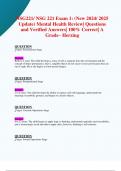NSG221/ NSG 221 Exam 1: (New 2024/ 2025
Update) Mental Health Review| Questions
and Verified Answers| 100% Correct| A
Grade– Herzing
QUESTION
Piaget: Sensorimotor Stage
Answer:
Birth to 2 years: The child develops a sense of self as separate from the environment and the
concept of object permanence, that is, tangible objects do not cease to exist just because they are
out of sight. He or she begins to form mental images.
QUESTION
Piaget: Preoperational Stage
Answer:
2 to 6 years: The child develops the ability to express self with language, understands the
meaning of symbolic gestures, and begins to classify objects.
QUESTION
Piaget: Concrete Operations Stage
Answer:
6 to 12 years: The child begins to apply logic to thinking, understands spatiality and reversibility,
and is increasingly social and able to apply rules; however, thinking is still concrete.
QUESTION
Piaget: Formal Operations Stage
,Answer:
12 to 15 years and beyond: The child learns to think and reason in abstract terms, further
develops logical thinking and reasoning, and achieves cognitive maturity.
QUESTION
Peplau's 4 Stages
Answer:
1) The orientation phase is directed by the nurse and involves engaging the client in treatment,
providing explanations and information, and answering questions.
2) The identification phase begins when the client works interdependently with the nurse,
expresses feelings, and begins to feel stronger.
3) In the exploitation phase, the client makes full use of the services offered.
4) In the resolution phase, the client no longer needs professional services and gives up
dependent behavior. The relationship ends.
QUESTION
RN Role Functions
Answer:
-Stranger: offering the client the same acceptance and courtesy that the nurse would to any
stranger.
-Resource person: providing specific answers to questions within a larger context
-Teacher: helping the client learn either formally or informally
-Leader: offering direction to the client or group
-Surrogate: serving as a substitute for another, such as a parent or sibling
-Counselor: promoting experiences leading to health for the client, such as expression of feelings
QUESTION
What is classical conditioning?
Answer:
, Ivan Pavlov: a learning process that occurs when two stimuli are repeatedly paired: a response
which is at first elicited by the second stimulus is eventually elicited by the first stimulus alone.
QUESTION
What is operant conditioning?
Answer:
B.F. Skinner: people learn their behaviors from their history or past experiences, particularly
those experiences that were repeatedly reinforced
QUESTION
Maslow's Hierarchy of Needs
Answer:
1) Physiologic needs: food, water, sleep, shelter, sexual expression, and freedom from pain
2) Safety and security: protection, security, and freedom from harm or threatened deprivation
3) Love and belonging needs: enduring intimacy, friendship, and acceptance
4) Esteem needs: the need for self-respect and esteem from others
5) Self-actualization: the need for beauty, truth, and justice.
QUESTION
Existential Therapy: Rational Emotive Therapy
Answer:
Therapist: Albert Ellis
A cognitive therapy using confrontation of "irrational beliefs" that prevent the individual from
accepting responsibility for self and behavior
QUESTION
Existential Therapy: Logotherapy




